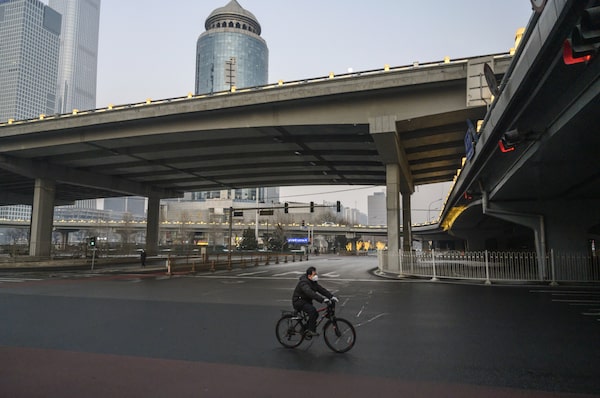
A Chinese man wears a protective mask as he rides through a nearly empty intersection in the normally busy Central Business District during the Friday rush hour on February 7, 2020 in Beijing, China.Kevin Frayer/Getty Images
While other Canadians landed at a Canadian Forces base 11,500 kilometres from the epicentre of a viral outbreak in Canada, Cameron Walker remained with his family in Hubei province, feeling a bit like the frog in boiling water.
“Every day, it gets slightly hotter,” said Mr. Walker, a businessman who has lived in China since 2002. And there is no real way out.
“The lid is on the pot,” he said from Xiangyang, the Hubei city where he described rising anxiety for those like him who remain in Hubei province, the locked-down epicentre of the viral epidemic that has now killed 723 in China, 699 of them in Hubei. Xiangyang is a city of six million that is 300 kilometres from Wuhan.
Experts monitoring coronavirus for signs of tipping point in coming weeks
But while 215 Canadians left Thursday on a pair of evacuation flights, Mr. Walker stayed in Hubei, where he felt a sense of dread that became more tangible when he watched officials in head-to-toe protective gear enter a nearby apartment building this week.
Hours later, a woman with a loudspeaker announced that a suspected case of the virus had been discovered, urging everyone to stay inside.
“I’m not crazy. I know that it’s still a relatively low risk, especially if we limit contact,” Mr. Walker said. But, “the closer it comes to home, the more concerned you get.”
When consular officials initially called Canadians in Hubei, Mr. Walker understood that he was not eligible for evacuation. His wife is Chinese. His eight-year-old daughter holds a Canadian passport, but was born in China and is still considered Chinese by local authorities. When Mr. Walker spoke with a Canadian representative, “I think he crossed us off the list” because members of his family are not Canadian, Mr. Walker said.
Canadian Forces personnel stand by to assist Canadians, who had been evacuated from China due to the outbreak of novel Coronavirus on an American charter plane, as they disembark from another aircraft at Canadian Forces Base (CFB) Trenton in Trenton, Ontario, Canada February 7, 2020. Courtesy of Edward Wang via REUTERS. THIS IMAGE HAS BEEN SUPPLIED BY A THIRD PARTY. MANDATORY CREDITEDWARD WANG/Reuters
Local authorities have since clarified who can be taken out of Hubei by foreign governments. Chinese foreign ministry spokeswoman Hua Chunying on Friday said “for Chinese nationals who are lineal relatives of foreign citizens in Wuhan, if they want to leave and also have valid international travel documents, they can leave with their families.
But Mr. Walker’s situation is also complicated: his home and his work are in China, where he runs an e-commerce business. He’s not sure he wants to leave. He’s worried that the riskiest place for his health is on an airplane with other evacuees. His wife and daughter’s travel documents are also in their home in Shenzhen.
Even so, his experience in Hubei reflects the broader sense of fear across a province where the death toll continues to rise, and authorities are taking increasingly harsh response measures — including going door-to-door to conduct health checks, and forcibly rounding up those who show signs of symptoms.
“We were going for half an hour walks at the beginning. Then that turned into 15 minute walks. And now we kind of go outside once [every] couple of days. Going forward, probably infrequently — only when necessary,” he said.
He is staying in an apartment with his parents-in-law, where he had come to celebrate the Lunar New Year. They have enough food, some of it left over from the holidays. He is running his own business remotely, while his daughter has resumed her studies by distance learning.
“I think we’ve got five days’ supply of paper, and then we’re going to have to figure something out,” Mr. Walker said.
Still, he is plagued by uncertainty. The day before authorities placed Xiangyang under lockdown, he saw departing flights beginning to sell out. “We could have left the night of Chinese New Year,” he said. “But we weren’t quite there yet. And that ended up being the last flight out of here.”
At first, he expected nothing more than inconvenience.
A woman is buying fruit in a local market in Chengdu, China on Thursday, Feb. 6, 2020.Yuyang LIU/The New York Times News Service
That changed this week, when he and his family watched out their window as people in full protective clothing went into a next-door building. Then came the announcement about a suspected case.
He and his family immediately decided to leave, driving through falling snow from the city to his in-laws’ countryside home. But it was frigid inside. Hubei is in southern China, where many houses have no winter heat.
“We decided we’re probably all going to get cold and sick if we stay here. So we did an about-face and came back,” Mr. Walker said.
Now, he’s not sure he can leave again.
“We saw some cars trying to leave this morning and just get turned around. So they obviously basically locked it down,” he said. “I think you can still go out and get groceries, get vegetables — as long as you come back pretty quickly.”
He largely agrees with the way Chinese authorities have handled the virus. And “if we stay in our apartment most of the time, and we’re careful enough when we leave, eventually we should be fine,” he said.
That leaves him with few options but to wait — and worry.
The family plans to “hunker down here. And hopefully things get better.”
 Nathan VanderKlippe
Nathan VanderKlippe